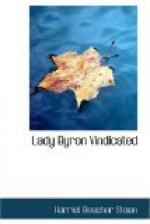This same writer goes on to show, by a series of extracts from Lord Byron’s published letters and journals, that his mind about this time was in a fearfully unnatural state, and suffering singular and inexplicable agonies of remorse; that, though he was accustomed fearlessly to confide to his friends immoralities which would be looked upon as damning, there was now a secret to which he could not help alluding in his letters, but which he told Moore he could not tell now, but ’some day or other when we are veterans.’ He speaks of his heart as eating itself out; of a mysterious person, whom he says, ’God knows I love too well, and the Devil probably too.’ He wrote a song, and sent it to Moore, addressed to a partner in some awful guilt, whose very name he dares not mention, because
‘There is grief in the sound, there is guilt in the fame.’
He speaks of struggles of remorse, of efforts at repentance, and returns to guilt, with a sort of horror very different from the well-pleased air with which he relates to Medwin his common intrigues and adulteries. He speaks of himself generally as oppressed by a frightful, unnatural gloom and horror, and, when occasionally happy, ’not in a way that can or ought to last.’
‘The Giaour,’ ‘The Corsair,’ ‘Lara,’ ‘Parisina,’ ‘The Siege of Corinth,’ and ‘Manfred,’ all written or conceived about this period of his life, give one picture of a desperate, despairing, unrepentant soul, whom suffering maddens, but cannot reclaim.
In all these he paints only the one woman, of concentrated, unconsidering passion, ready to sacrifice heaven and defy hell for a guilty man, beloved in spite of religion or reason. In this unnatural literature, the stimulus of crime is represented as intensifying love. Medora, Gulnare, the Page in ‘Lara,’ Parisina, and the lost sister of Manfred, love the more intensely because the object of the love is a criminal, out-lawed by God and man. The next step beyond this is—madness.
The work of Dr. Forbes Winslow on ’Obscure Diseases of the Brain and Nerves’ {258} contains a passage so very descriptive of the case of Lord Byron, that it might seem to have been written for it. The sixth chapter of his work, on ‘Anomalous and Masked Affections of the Mind,’ contains, in our view, the only clue that can unravel the sad tragedy of Byron’s life. He says, p.87,—
’These forms of unrecognised mental disorder are not always accompanied by any well-marked disturbance of the bodily health requiring medical attention, or any obvious departure from a normal state of thought and conduct such as to justify legal interference; neither do these affections always incapacitate the party from engaging in the ordinary business of life . . . . The change may have progressed insidiously and stealthily, having slowly and almost imperceptibly induced important molecular modifications in the delicate vesicular neurine of the brain, ultimately resulting




